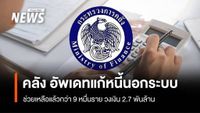Thailand’s Ministry of Finance has unveiled the latest details of its ambitious plan to tackle the country’s mounting national debt and the persistent problem of informal lending, in an announcement that underscores both the scale of the challenge and the government’s multifaceted response. On September 27, 2025, Mr. Pornchai Thiravech, Director of the Fiscal Policy Office and spokesperson for the Ministry of Finance, provided a comprehensive update on the nation’s debt status and ongoing efforts to provide financial relief to citizens grappling with off-the-books loans.
According to the Ministry’s official statement, the national debt is projected to soar to 2.7 trillion baht by January 25, 2025, a figure that has prompted the government to implement a rigorous debt management strategy. This plan covers the period from October 1, 2023, through January 25, 2025, and is designed to ensure fiscal discipline while reducing the debt burden on the nation.
Current figures reveal that Thailand’s national debt stands at 90,389 million baht, with interest payments amounting to a staggering 2,729.45 billion baht. In a bid to manage this financial load, the government has announced plans to issue bonds totaling 1,151 million baht by January 11, 2025, and has allocated a budget of 40.25 billion baht specifically for debt servicing. The Ministry of Finance remains at the helm of these efforts, overseeing the resolution and sustainability of the nation’s debt.
But the government’s approach is not limited to macro-level fiscal maneuvers. Recognizing the widespread impact of informal debt—often incurred by citizens at exorbitant interest rates outside the formal banking system—the Ministry has joined forces with specialized financial institutions, including the Government Savings Bank and the Bank for Agriculture and Agricultural Cooperatives. Together, they have rolled out a series of targeted loan programs aimed at providing much-needed relief to those ensnared by illegal lenders.
Between December 1, 2023, and September 25, 2025, these initiatives have already borne fruit. As reported by the Ministry, 90,389 individuals with informal debts have been approved for financial assistance through various loan schemes. The total amount approved through these programs now stands at 2,729.45 million baht, marking an increase of 1,151 beneficiaries and an additional 40.25 million baht in approvals since September 11, 2025. These figures, while significant, also highlight the scale of the informal debt problem across the country.
Mr. Pornchai elaborated on the government’s multi-pronged strategy, stating that these loan programs include the People’s Bank Loan Project, loans specifically for settling informal debts, revolving funds to support impoverished farmers, and credit-building initiatives designed to create opportunities for sustainable livelihoods. There are also schemes aimed at supporting those registered as informal debtors, helping them transition into the formal financial system and break free from cycles of predatory lending.
"The Ministry of Finance is committed to promoting fair and accessible financial services for all citizens," Mr. Pornchai emphasized, according to reporting from The Nation. "By expanding regulated lending channels, we aim to protect vulnerable borrowers from illegal lenders who charge interest rates far above legal limits."
One of the most notable elements of the government’s plan is the promotion of Pico Finance—provincial-level microfinance businesses operating under official supervision. This policy is intended to provide small-scale borrowers with legitimate access to credit at fair interest rates, thereby reducing reliance on unscrupulous lenders and giving informal creditors a legal pathway to operate within the system.
As of September 2025, there are 1,160 licensed Pico Finance entities (either limited companies or partnerships) operating across 75 provinces. These businesses have collectively approved 5,272,976 Pico Finance loan accounts for individual borrowers, amounting to a total of 52,890.49 million baht. Of this, outstanding loans as of the end of July 2025 stood at 382,337 accounts, with a combined value of 7,525.33 million baht. The Ministry encourages interested businesses to learn more about the licensing process at www.1359.go.th or by calling the government’s financial hotline at 1359.
The Ministry’s spokesperson was quick to point out that these efforts are not just about numbers—they’re about restoring hope and financial dignity to ordinary people. By offering legal avenues for borrowing, the government hopes to break the stranglehold of informal debt and foster a more inclusive financial ecosystem. "We want to ensure that people have access to credit without falling prey to illegal moneylenders," Mr. Pornchai said. "This is a critical step toward sustainable economic recovery and social stability."
Of course, the scale of the challenge remains daunting. The Ministry’s own projections show that, without continued vigilance and innovation, the national debt could spiral further, especially if informal lending remains unchecked. The government’s emphasis on fiscal discipline and sustainable debt levels is thus more than a bureaucratic mantra—it’s a reflection of the urgent need to balance economic growth with responsible borrowing and lending practices.
For the average Thai citizen, these policies mean greater transparency and more choices when it comes to managing personal debt. The government’s bond issuance and budget allocations are designed to stabilize the macroeconomic environment, while the proliferation of licensed microfinance providers offers a lifeline to those who might otherwise be trapped in cycles of debt and despair.
But there are still questions about the long-term effectiveness of these measures. Will the expansion of regulated microfinance truly curb illegal lending practices? Can the government’s fiscal discipline keep pace with the growing demands of debt servicing and social welfare? Only time—and continued public scrutiny—will tell.
For now, the Ministry of Finance urges anyone seeking more information to visit www.1359.go.th, where detailed guidance on debt relief programs, loan applications, and Pico Finance licensing is readily available. The hotline at 1359 remains open for those needing direct assistance or clarification.
As Thailand navigates this critical juncture, the government’s blend of large-scale fiscal management and grassroots financial support offers a template for other nations grappling with similar issues. Whether these efforts will be enough to secure the country’s financial future remains to be seen, but the commitment to transparency, accessibility, and fairness is a promising sign for borrowers and taxpayers alike.

